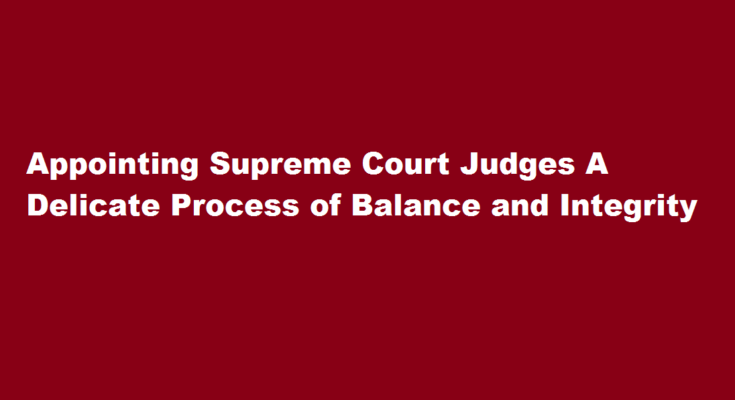Introduction
The appointment of Supreme Court judges is a crucial aspect of any judicial system, requiring careful consideration and adherence to principles of balance, independence, and integrity. This article explores the unique and informative process of appointing judges to the highest court in the land, highlighting the key factors involved and the importance of maintaining a fair and impartial judiciary.
The Significance of Supreme Court Appointments
The Supreme Court plays a pivotal role in interpreting the law and upholding constitutional rights, making the appointment of judges a matter of great significance. The decisions made by the court can have far-reaching implications on a nation’s legal landscape, affecting the lives of citizens for generations to come. Therefore, it is crucial to establish a process that ensures the selection of competent and unbiased individuals who possess the necessary legal acumen, integrity, and commitment to justice.
Merit-Based Selection
A fundamental principle of appointing Supreme Court judges is merit-based selection. The process typically begins with a search for candidates who possess a distinguished legal background, extensive experience, and a proven track record of upholding the rule of law. This search may involve consultation with legal experts, bar associations, and senior members of the judiciary to identify individuals who possess the necessary qualifications and qualities required for the position.
Transparency and Public Consultation
Maintaining transparency in the appointment process is vital to bolster public trust in the judiciary. Public consultation can involve inviting comments from citizens, legal professionals, and organisations regarding potential nominees. This input provides valuable perspectives and helps ensure a diverse and inclusive judiciary. Additionally, public disclosure of selection criteria, such as qualifications, experience, and professional achievements, fosters transparency and accountability in the process.
Independent Selection Committee
To uphold the independence of the judiciary, many countries establish an independent selection committee responsible for vetting and shortlisting candidates. This committee typically comprises legal experts, eminent jurists, and representatives from the executive, legislative, and judicial branches of government. Its composition should be diverse, reflecting the pluralistic nature of society, and it should function autonomously from political interference. The committee’s role is to evaluate candidates based on their qualifications, legal expertise, moral character, and commitment to upholding the constitution.
Scrutiny and Confirmation
Once the selection committee completes its evaluation, it presents a shortlist of candidates to the appointing authority, typically the executive branch. The nominees undergo rigorous scrutiny, including background checks, to ensure their suitability for the position. In some systems, nominees may also face confirmation hearings before the legislature to assess their legal expertise, impartiality, and commitment to judicial independence. This stage allows for a thorough review of the candidates and facilitates the public’s understanding of their potential contributions to the judiciary.
FREQUENTLY ASKED QUESTIONS
Who appoints every Judge of the Supreme Court?
The Supreme Court of India comprises the Chief Justice and not more than 33 other Judges appointed by the President of India.
Who was the first CJI of India?
Harilal Jekisundas Kania, the 1st chief justice, was the uncle of Madhukar Hiralal Kania, the 23rd chief justice.
Who is Lady Justice in India?’
ANS: With a quiet efficiency that defined her career, on 6 October 1989, M. Fathima Beevi became the first female judge in the Supreme Court, a position she held till her retirement on 29 April 1992.
Conclusion
The process of appointing Supreme Court judges is a critical undertaking that demands careful attention to maintaining a fair and impartial judiciary. By adhering to principles of merit-based selection, transparency, public consultation, and independent scrutiny, nations can strengthen their judicial systems and ensure the appointment of competent judges who uphold the rule of law and safeguard constitutional rights.
Read Also : Appointing a Sole Arbitrator A Comprehensive Guide



